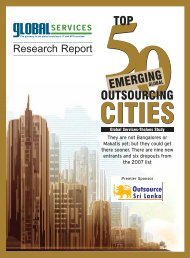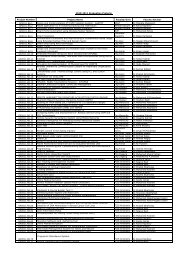Country Report for Egypt
Country Report for Egypt
Country Report for Egypt
Create successful ePaper yourself
Turn your PDF publications into a flip-book with our unique Google optimized e-Paper software.
O U T S O U R C I N G T O A F R I C A<br />
<strong>Country</strong> <strong>Report</strong> <strong>for</strong> <strong>Egypt</strong><br />
Mohammed Anwar El-Sadat. Mubarak is currently serving his fi fth term in offi ce. He is the<br />
leader of the ruling National Democratic Party. Prime Minister Dr. Ahmed Nazif was sworn in<br />
as prime minister on 9 July 2004, following the resignation of Dr. Atef Ebeid from his offi ce.<br />
Although power is ostensibly organised under a multi-party semi-presidential system, whereby<br />
the executive power is theoretically divided between the president and the prime minister,<br />
in practice it rests almost solely with the president who traditionally has been elected in<br />
single-candidate elections <strong>for</strong> more than fi fty years. <strong>Egypt</strong> also holds regular multi-party parliamentary<br />
elections. The last presidential election, in which Mubarak won a fi fth consecutive<br />
term, was held in September 2005.<br />
In late February 2005, President Mubarak announced in a surprise television broadcast that<br />
he had ordered the re<strong>for</strong>m of the country’s presidential election law, paving the way <strong>for</strong><br />
multi-candidate polls in the upcoming presidential election. For the fi rst time since the 1952<br />
movement, the <strong>Egypt</strong>ian people had an apparent chance to elect a leader from a list of various<br />
candidates. The president said his initiative came out of “my full conviction of the need<br />
to consolidate ef<strong>for</strong>ts <strong>for</strong> more freedom and democracy”. However, the new law placed draconian<br />
restrictions on the fi ling <strong>for</strong> presidential candidacies, designed to prevent well-known<br />
candidates such as Ayman Nour from standing against Mubarak, and paved the road <strong>for</strong> his<br />
easy re-election victory. Concerns were once again expressed after the 2005 presidential elections<br />
about government interference in the election process through fraud and vote rigging,<br />
in addition to police brutality and violence by pro-Mubarak supporters against opposition<br />
demonstrators. After the election, <strong>Egypt</strong> imprisoned Nour, and the US government stated<br />
the ‘conviction of Mr. Nour, the runner-up in <strong>Egypt</strong>’s 2005 presidential elections, calls into<br />
question <strong>Egypt</strong>’s commitment to democracy, freedom, and the rule of law.’<br />
As a result, most <strong>Egypt</strong>ians are sceptical about the process of democratisation and the role<br />
of the elections. Less than 25 per cent of the country’s 32 million registered voters (out of a<br />
population of more than 72 million) turned out <strong>for</strong> the 2005 elections. A proposed change<br />
to the constitution would limit the president to two seven-year terms in offi ce.<br />
Thirty-four constitutional changes voted on by parliament on 19 March 2007 prohibit parties<br />
from using religion as a basis <strong>for</strong> political activity; allow the drafting of a new antiterrorism<br />
law to replace the emergency legislation in place since 1981, giving police wide<br />
powers of arrest and surveillance; give the president power to dissolve parliament; and end<br />
judicial monitoring of election. As opposition members of parliament withdrew from voting<br />
on the proposed changes, it was expected that the referendum would be boycotted by a<br />
great number of <strong>Egypt</strong>ians in protest of what has been considered a breach of democratic<br />
practices. Eventually it was reported that only 27 per cent of the registered voters went to<br />
the polling stations under heavy police presence and tight political control of the ruling<br />
National Democratic Party. It was offi cially announced on 27 March 2007 that 75.9 per cent<br />
of those who participated in the referendum approved of the constitutional amendments<br />
introduced by President Mubarak, and this was endorsed by opposition free parliament,<br />
thus allowing the introduction of laws that curb the activity of certain opposition elements,<br />
particularly Islamists.<br />
Thus <strong>Egypt</strong> is a safe and secure destination.<br />
03_Africa_<strong>Report</strong>09_<strong>Egypt</strong>.indd 54 2/25/09 4:18:19 PM<br />
54





